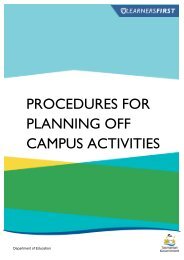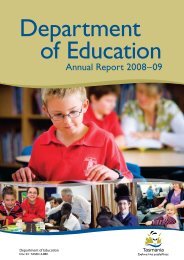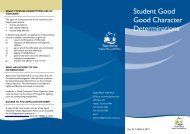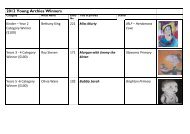Tas Curriculum K-10 - Languages - Italian - Department of Education
Tas Curriculum K-10 - Languages - Italian - Department of Education
Tas Curriculum K-10 - Languages - Italian - Department of Education
Create successful ePaper yourself
Turn your PDF publications into a flip-book with our unique Google optimized e-Paper software.
Adverbs<br />
Formation <strong>of</strong> adverbs attaching -mente e.g.<br />
velocemente, lentamente<br />
Recognition <strong>of</strong> comparative and<br />
superlative forms e.g. meglio di, peggio<br />
di, il migliore<br />
Articles<br />
Omission <strong>of</strong> partitive article in questions<br />
or negative sentences e.g avete bibite?,<br />
non ho caramelle<br />
Omission <strong>of</strong> article when referring to<br />
members <strong>of</strong> the family in the singular e.g. mia<br />
sorella, le mie sorelle<br />
Conjunctions<br />
Use <strong>of</strong> common conjunctions e.g. e, ed, anche,<br />
ma, però, infatti, quindi, magari, cioè,<br />
purtroppo<br />
Nouns<br />
Nouns ending in -ista and plurals e.g. la turista,<br />
l’artista<br />
Invariable forms in the plural e.g. la città, le città,<br />
il film, i film<br />
Use <strong>of</strong> suffixes e.g. -ino, -etto, -ello, -one, -<br />
accio<br />
Use <strong>of</strong> prefixes e.g. dis, in<br />
False friends, cognates, idioms<br />
Increasing range <strong>of</strong> false-friends e.g. arrangiarsi,<br />
attualmente, argomento, palazzo<br />
Learn some commonly used idiomatic<br />
expressions that are also used in English e.g. è<br />
più facile dirlo che farlo, essere giù, mollare<br />
qualcuno<br />
Learn some commonly used idiomatic<br />
expressions that are translated differently in<br />
English e.g. non vedo l’ora di __ , essere<br />
suonato, prendere in giro, fare quattro salti<br />
Negation<br />
Double negative e.g. non-mai, né __ né,<br />
non affatto<br />
Learning opportunities standard five<br />
• Have students use the target language in a new<br />
context (e.g. give a short PowerPoint ®<br />
presentation in the target language to the class<br />
about their own family’s favourite foods, daily<br />
meals, meals for special occasions and festive<br />
foods – ‘We usually __’, ‘Sometimes we __’,<br />
‘For lunch __’, ‘On Sundays __’, ‘During<br />
(festival) period we __’, ‘Traditionally __’, ‘For<br />
parties __’).<br />
• Have students express personal circumstances<br />
and future plans e.g. in pairs, discuss possible<br />
changes to their own health and / or lifestyle,<br />
expressing current state and future plans – ‘I<br />
prefer __’, ‘I intend to __’, ‘I plan to __’, ‘I<br />
would like to __’, ‘I’m determined to __’, ‘I will<br />
try to __’, ‘I need to __’<br />
• Have students explore how language has<br />
evolved to accommodate new communication<br />
models e.g. decipher text messages in the<br />
target language and reconstruct the full<br />
messages. Comment on how language has<br />
evolved to accommodate new technologies.<br />
• Provide opportunities for students to compare<br />
the language used in different text types e.g.<br />
SMS, email, telephone message, letter.<br />
• Have groups <strong>of</strong> students present a recipe in the<br />
target language, visually supported with a<br />
PowerPoint presentation or a cooking<br />
demonstration.<br />
• Have students listen to podcasts <strong>of</strong> dialogues in<br />
the target language, and /or create their own<br />
podcasts.<br />
• Have students communicate with their peers in<br />
the target country via email or blogs to<br />
compare aspects <strong>of</strong> their lives.<br />
• Have students write an advertisement for a<br />
pin-up board promoting themselves for a job<br />
such as baby-sitting or odd jobs.<br />
• Discuss with students the meaning and<br />
translation <strong>of</strong> proverbs in English and the target<br />
language e.g. ‘it’s raining cats and dogs’ and its<br />
equivalent in the target language.<br />
63

















